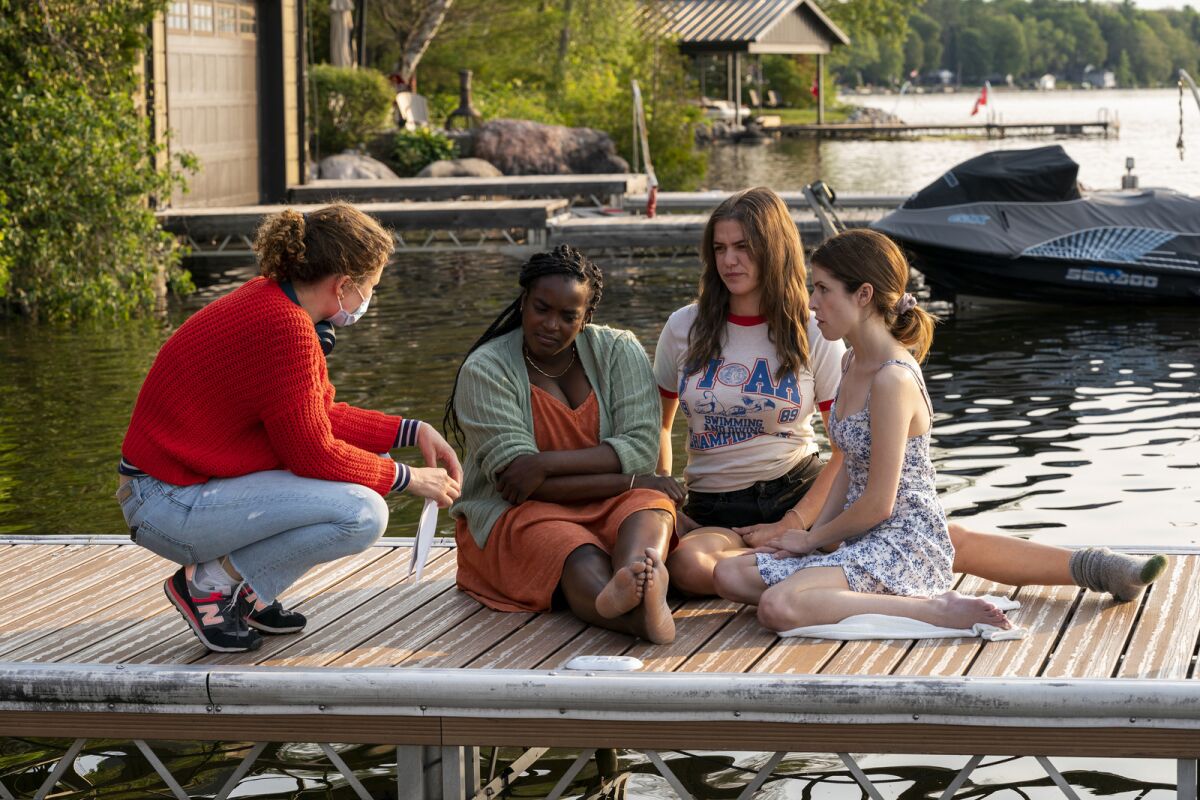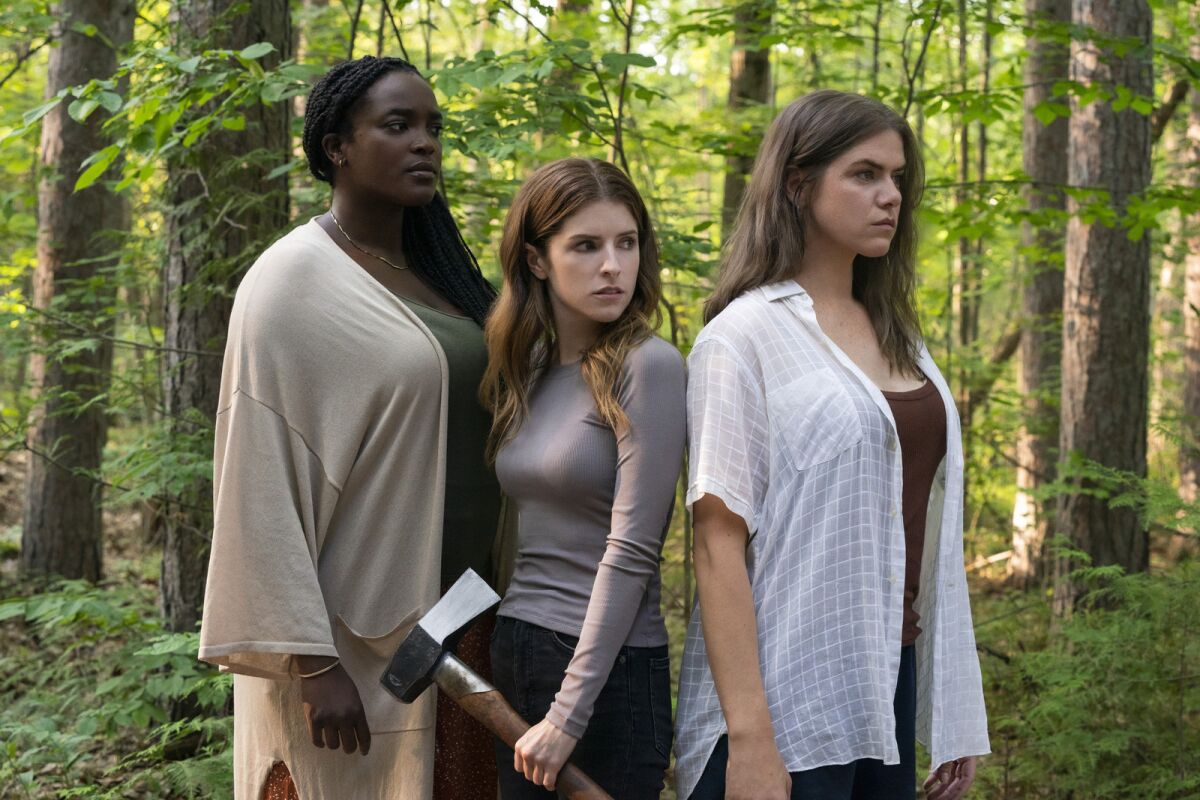‘I’m the evidence’: Anna Kendrick opens up about the abuse that shaped her new film
Anna Kendrick’s latest film, “Alice, Darling,” didn’t need an emotional abuse consultant. Its emotional abuse consultant was Anna Kendrick.
Lead actor and executive producer Kendrick had recently come out of an emotionally abusive relationship of her own when she was sent the screenplay, written by Alanna Francis, which details the experience of a woman struggling, while on vacation with two close friends, to come to terms with the fact that she’s been psychologically abused by her boyfriend.
“I really related to Alice’s obsessive mind,” Kendrick told The Times. The script had a line in which Alice wishes she could purify her thoughts, and although Kendrick didn’t have that same thought, she remembers writing in her journal, “I’m just going to try a little harder. If I could just get it right, if I could make it perfect, if I could just say it in the perfect way, I’ll be OK.”
“It’s this totally irrational hope that if I’m just a little bit better, I’ll be safe. It’s like having a pair of pliers on your heart,” she said.
“Alice, Darling,” opening in Los Angeles Friday, was filmed in June and July of 2021, only six months after Kendrick received the script. But with the help of her therapist, a protective cast and crew, and director Mary Nighy’s offer to provide help if things got too intense, Kendrick felt safe. She explained that this was crucial, because when part of your original trauma is being invalidated, you want to surround yourself with people who understand.

Director Mary Nighy, left, confers with actors Wunmi Mosaku, Kaniehtiio Horn and Anna Kendrick on the set of “Alice, Darling.”
(Lionsgate)
Many in the cast and crew not only sympathized with Kendrick’s situation, they’d lived it themselves, either as survivors or friends of survivors.
“Unfortunately, I’ve been in a lot of emotionally and other types of abusive relationships,” said Kaniehtiio Horn, who plays Alice’s friend Tess. “It’s pretty safe to say 85% of my relationships were pretty abusive.”
Horn said that, although she does not recommend trauma bonding, it was a need for this specific film, because the actors established trust through their shared experiences. Before meeting in person, she and Kendrick connected over a lengthy video call.
“In an hour I learned a lot about Anna Kendrick,” Horn said, “and she learned a lot about me. Really deeply layered things that nobody will probably ever hear.”
Kendrick remembers watching movies while in her own abusive relationship and never recognizing her own experience, which made her question whether it was just normal.
She said she told Nighy that she’d rather have 1 in 10 people watch the movie and think, “Simon was a jerk, but don’t be so dramatic,” rather than have a moment where he shoves Alice into a wall so everybody gets on the same page that he’s an abusive bad guy. “That was a big part of my problem. ‘Well he never hit me and I’m not really afraid that he’s going to hit me. How do I discern between normal conflict and abuse? Why is my body in so much fear all of the time? Why do I wake up feeling like he’s in bed next to me and wondering, ‘OK, do I have 30 seconds before I start performing or … ?’”
Kendrick discussed how living in an abusive relationship creates so much self-doubt that people question their own reality. She describes it as, “He’s so convinced that I am a monster that I can’t see how I am not.”
During the final stages of editing, Kendrick urged Nighy to “pull back” even further, recounting an early conversation with co-star Wunmi Mosaku about why they liked Francis’ script. “I said that I love that it really relied on Alice’s experience rather than cataloging evidence of the behavior from Simon,” Kendrick recalled. “Wunmi said, ‘But Anna, you’re the evidence.’”
At this point in our phone interview, Kendrick cuts herself off and starts apologizing. It takes a beat to realize she’s crying.
“I was begging Mary, ‘Can Alice be the evidence?’” Kendrick said. “Because not only do I want us to not make a movie that’s already been made, but personally, I need to trust that I’m the evidence. Part of it was like, if you can’t trust Alice, then I can’t trust myself. So it was really, really important that the movie relied so heavily on just staying with Alice.”
She also resisted any implication that physical abuse was only a matter of time: “You don’t have to believe that it might get physical for you to feel like you’re allowed to leave, that you deserve to be treated better, deserve to feel safe.”
In her own recovery, Kendrick said no amount of cataloging evidence — writing down dates, times, arguments and becoming a “detective in [her] own life” — could convince her that she wasn’t imagining it all. “To sit in grief and to believe my own body has been so much harder, but so much more rewarding,” Kendrick said. “I have to believe we can follow Alice and trust her, because that’s my work now: to trust myself.”
Nighy, making her feature film directing debut, said she felt the weight of doing the story justice, particularly with so many survivors on the closeknit set — where weekend barbecues were common and relationships forged during a two-week quarantine grew closer still. When she was interviewing people for jobs on the crew, people would tell Nighy they wanted to work on it because it resonated with them. During post-production, she and film editor Gareth C. Scales would stop and take walks to get a breather after repeatedly watching scenes in which Kendrick’s character anxiously pulls out her hair.
Nighy said her team wanted the film to stand out not only because it focused on psychological versus physical abuse, but also in the restraint used in portraying Alice and her abuser, Simon. “We were really aiming for something quite nuanced.”
Nighy held screenings for friends and family to get a sense of whether that nuance was properly captured. She was shocked when good friends of hers, whom she hadn’t known had experienced abuse, came up to her to afterward to talk about it. Audience members approached her in tears after the film screened for the public at the Toronto International Film Festival.
One woman, a clinical psychologist, cried and said, “I think your film could save lives,” Nighy recalled.
Before Kendrick received the script, there was a scene in which Alice took off her sweater and had visible bruises. Nighy asked that it be removed from the draft. “In society, physical abuse is very clearly defined as an evil, and I think psychological and emotional abuse, even for those who have suffered it, can sometimes question whether it’s a real thing.”
Nighy said that Kendrick told her, “Some people won’t get this at all.” At screenings the director encountered men who said Simon didn’t seem that bad. But she felt it was “better to be accurate [and] restrained” so that people watching it could discern their own situation.
The subtle tension reaches a climax in a scene toward the end of the film in which Alice is sandwiched between her friends as they try to take her away from Simon. Nighy said Kendrick had a strong opinion about how she wanted to play it, and Kendrick said she remembers thinking everybody on set must have been questioning her emotional state. “I know this looks crazy, but I’ve never been more certain that this is right,” Kendrick remembers thinking.
In the scene, Alice refuses to look at Simon, her eyes locked on her friend Sophie’s. “Sophie’s actions have just knocked me onto a tightrope of willingness,” Kendrick said. “Which was the phrase I used on that day, that I knew made me sound completely f— insane. I was like, ‘If I break eye contact with her, I will fall off the tightrope. This is a survival technique.’”
For his part, actor Charlie Carrick created his portrayal of Simon by researching abuse and thinking about how most people’s desire for control comes from their own fears and insecurities. In his research, it was “very hard to find testimony from somebody who has been a perpetrator of that abuse,” let alone somebody who can speak to how they got to the place of being an abuser. He talked to Nighy about how Simon is incapable of regulating his emotions.
Kendrick called Carrick a valuable creative ally. “He really understands that Simon genuinely believes himself to be the victim.” She added, “Simon was never the mustache-twirling villain who felt entitled to hurt people.”
Because of how personal the material was, Kendrick found it much easier to talk to Carrick about Simon than think about Alice.
“I had spent over a year desperately focusing on the Simon,” said Kendrick, who has not spoken publicly about the identity of her abuser. “It was too painful to look at what I was going through, but I was very comfortable speculating about the motivations, inner worlds, thoughts and emotions of the Simon. Alice and what she was going through was much less comfortable for me.”

“I know this looks crazy, but I’ve never been more certain that this is right,” Kendrick remembers thinking about the climactic scene in “Alice, Darling.”
(Lionsgate)
Mosaku, who delivers a commanding performance as supportive friend Sophie, said the movie’s climax relies on Alice’s friends realizing they could lose her: “You can lose someone spiritually, emotionally, physically. Women die every week at the hands of a partner or ex-partner.”
In Kendrick’s situation, as in Alice‘s, it was friendship that pulled her back to reality. “That was the first thing that made me drop back into my body in a year and a half; somebody just doing the one thing he couldn’t do, which was telling me, ‘You’re right, I’m sorry, you’re not crazy.’
“I’m so grateful to that person and the gift [they] gave me,” Kendrick continued. “I don’t know how to describe it other than feeling like one of those dorky CGI ghosts in ’90s movies that suddenly enter back into your body and you wake up and you’re like, ‘Oh my God, I’m here. Oh! I’m hungry for the first time in forever.’”
And although the film’s ending allows the viewer to have hope for Alice, it also underscores a lesson Kendrick has learned from her own experience: “Alice has got a long journey ahead of her.”
For all the latest Entertainment News Click Here
For the latest news and updates, follow us on Google News.
